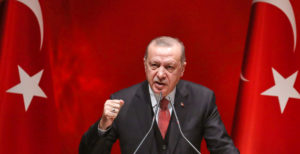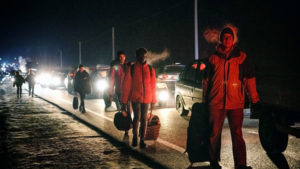This week, two activists are facing trial under the UK’s Terror Act for the “crime” of holding a flag at a demonstration. But this wasn’t a Palestinian flag, which former Home Secretary Suella Braverman has said could be a criminal offence. It was Kurdish.
Though troubling, this assault on free expression is far from an isolated incident. Over the past year, anti-terror police have arrested, charged and harassed a number of British volunteers who joined the Kurdish-led, UK-backed fight against Isis, along with their relatives. I have been detained and questioned for hours by anti-terror police on the UK border due to my reporting on the Kurdish issue. The Kurdish community faces regular police harassment and home raids.
“It’s a freedom of expression issue,” says Mark Campbell, a photojournalist and one of the activists on trial for holding a flag associated with the Kurdistan Workers’ Party (PKK), a proscribed terrorist organisation in the UK, at a demonstration in London. “But it’s also a highly political issue — because that flag represents Kurdish peoples’ struggle for basic human and political rights in Turkey.”
Beritan, another Kurdish activist, will join Campbell in the dock. “Why should the British government be afraid of me, or of Kurds?” she asks. “Our flag is the symbol of a peaceful Kurdish nation, and a [political] programme of education, equality and democracy for all. Is this a danger to Britain?”
Given that the West relied on the armed Kurdish movement, spearheaded by the PKK, to lead the ground campaign against Isis, the Kurds might be forgiven for expecting a fair hearing. The British authorities had no complaints when more than 10,000 Kurdish fighters gave their lives to rid the world of the Isis caliphate. Or when, backed by US airstrikes, they saved the Yazidi minority from genocide. But Western policy-makers have short memories — and the Kurds have been all too often betrayed by their nominal Western allies. Today, the UK Kurdish community remains criminalised and subjected to what its representatives describe as discriminatory, illiberal treatment in order to appease Turkey’s increasingly autocratic President Recep Tayyip Erdoğan, who views them as a political threat.
Will Campbell and Beritan be let off the hook? The UK’s Supreme Court has previously ruled against protestors who displayed a PKK flag, arguing that the infringement of the right to freedom of expression was outweighed by the need to deny the Kurdish movement “a projected air of legitimacy“. But a number of other high-profile anti-Kurdish trials have collapsed, including those targeting UK volunteers in the fight against Isis. In one case, UK police sentenced former soldier Dan Burke with terror offences for supporting the Kurdish-led, US-backed Syrian Democratic Forces (SDF) in their fight. Both the father and 19-year-old brother of another volunteer, Dan Newey, were also charged with terror offences after the father sent Newey £150.
“The British state has repeatedly contradicted its own foreign policy,” Newey tells me. “While simultaneously funding, arming, training and working alongside the [Kurdish-led] Syrian Democratic Forces, the UK government charged internationalist volunteers [in the SDF] with ridiculous terror offences in order to appease Turkey.”
Burke spent 10 months on remand in jail without ever going to trial to clear his name. He suffered the humiliation of being labelled “Jihadi Dan” despite devoting his life to the struggle against radical Islam. Meanwhile, Newey’s family suffered irrevocable harm, losing work as a result of the police harassment. Burke would later be killed fighting in Ukraine, where he travelled in 2022 to join the struggle against Russia’s invasion. Yet even after his body was repatriated to the UK, his funeral was staked out by UK police. Prosecutors failed in both cases to present evidence against Burke or the Neweys, while other similar trials have also collapsed.
These trials are part of a broader pattern of harassment and intimidation. Last month, the Kurdish community in London announced that it is bringing a lawsuit against the police over a violent, disproportionate raid on their community centre in Haringey. They also highlight how its representatives are regularly detained at the UK border under a controversial power: Schedule 7 of the Terror Act, one of the most invasive of its kind in Western Europe, which enables police to interrogate people without any right to silence, and to demand phone and laptop passwords. One Kurdish politician recently won a ruling suggesting the power was being used in a discriminatory fashion against the Kurds, but Kurdish figures such as the former mayor of London’s Haringey borough, Ali Gul Ozbek, are still detained every time they fly.
Last September, I got a taste of this myself, when I was detained under Schedule 7 for the second time and interrogated extensively on my work and reporting in and around Kurdistan, my views on the Turkish government, and British foreign policy in the Middle East. A middle-aged Welsh woman who held a poetry reading with Kurdish music and a member of a delegation observing the Turkish elections were among many others targeted by the same power last year.
And yet, there seems to be little public interest in these costly and aggressive police assaults on Kurdish people who stand for self-determination, women’s rights and democracy — values shared by many Britons. Rather, incidents of repression tend to take place around the time of high-profile meetings between UK and Turkish officials. The community centre, for instance, was raided just days after Defence Minister Grant Shapps secured an arms deal with his Turkish counterpart, while Burke was arrested in the days after President Erdoğan visited London.
The extent of Turkish-UK security cooperation remains unclear. Yet these trials and arrests suggest significant Turkish influence over UK security and foreign policy. “As a Nato ally and a key trading partner, the Turkish state holds considerable sway in its relationship with the UK: the military and intelligence collaboration between the two states has a decades-long history,” says Iida Käyhkö, a security studies researcher at London’s Royal Holloway University, who focuses on the criminalisation of the Kurds.
Elsewhere in Europe, Turkey has been seeking extraordinary concessions in return for dropping its opposition to Sweden and Finland joining Nato. Erdoğan’s list of demands has included more raids on the Kurdish community, the removal of Kurdish flags, and the detention and deportation of scores of Kurdish exiles, including an Iranian Kurdish member of Sweden’s Parliament with no administrative or legal links to Turkey whatsoever. He also wants upgrades to its F-16 fighter jets and permission for a fresh ground assault against Kurdish-led regions in northern Syria. It appears he is willing to imperil Nato in pursuit of his anti-Kurdish agenda.
From Turkey’s perspective, the PKK and the UK’s Syrian Kurdish allies are one and the same: separatist terrorists. But while the PKK has long been included on UK and EU terror lists, no EU or international court has found that the PKK meets this definition. When a test case was brought in Belgium, the country’s highest court found that the Kurdish movement could not be considered a terrorist organisation, but instead a legitimate party to an ongoing civil conflict. “There is no doubt that PKK meets all the criteria that allow it to be considered as a political-military organisation, which carries out an armed struggle against Turkish security services, army and authorities, towards the realisation of the right to self-determination of the Kurdish people,” a lawyer involved in the case told me at the time.
Kurdish representatives argue that delisting the PKK from terror lists would enable both Turkey and the PKK to be held to higher legal standards — especially given that some of the crimes which Turkey imputed to the PKK in the Belgian case were found to have been committed by the Turkish forces themselves. Delisting would also pave the way toward re-opened peace negotiations and a diplomatic, negotiated settlement. Käyhkö argues: “The consistent pattern of repression targeted at Kurdish democratic political activity undermines not only the reputation of the British state, but broader prospects for peace, stability and democracy in the region.”
But as Campbell correctly observes: “The UK is politicising law in favour of one of the world’s worst rights abusers.” The Belgian government ignored its own court’s ruling so as to keep Turkey sweet. And the UK’s latest anti-Kurdish trial will probably demonstrate once again the way in which Erdoğan’s virulent anti-Kurdish agenda is allowed to undermine the best interests and judgement of Western states.
Disclaimer
Some of the posts we share are controversial and we do not necessarily agree with them in the whole extend. Sometimes we agree with the content or part of it but we do not agree with the narration or language. Nevertheless we find them somehow interesting, valuable and/or informative or we share them, because we strongly believe in freedom of speech, free press and journalism. We strongly encourage you to have a critical approach to all the content, do your own research and analysis to build your own opinion.
We would be glad to have your feedback.
Source: UnHerd Read the original article here: https://unherd.com/




